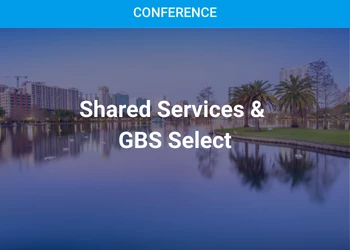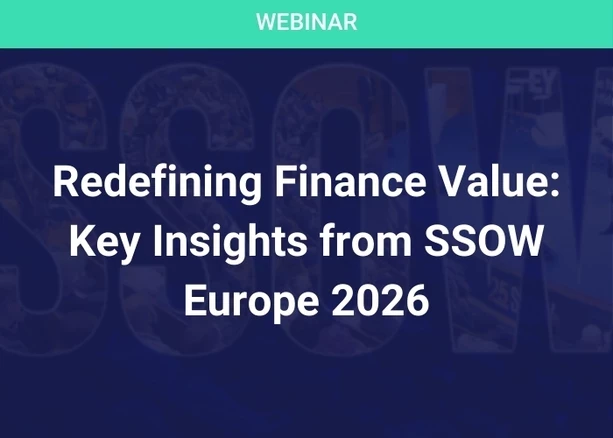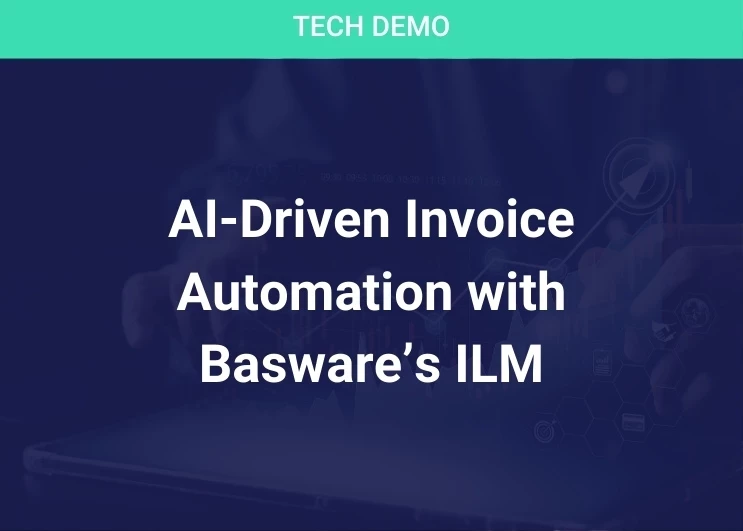Moments of Pain and Glory: Michael Lockard, VP Shared Services, Wal-Mart
Add bookmarkSSON: Let’s begin by congratulating you on your recent award as runner-up [in the Best New Captive SSO category at the Shared Services Excellence Awards North America 2009, held in Orlando in March].
Michael Lockard: Well thank you; we are very proud of the award as we weren’t sure what the competition was like. We’ve learned a lot and we had a great time in Orlando.
SSON: So how long has your center been set up?
Michael Lockard: It started February 2006.
SSON: Can you give us a bit of background as to how many customers you are servicing?
Michael Lockard: Sure. we have two locations here in Bentonville, Arkansas and Derby, Kansas; we have 900 associates and we service the United States for Wal-Mart Stores, so that’s about $300 billion of revenue out of our about $400 billion of total company revenue.
SSON: And you are basically directing the whole thing…
Michael Lockard: Yes; our job titles here are Vice President of Shared Services and we report to the Corporate Controller who then reports to the CFO.
SSON: Were you there from the initial set up?
Michael Lockard: I was not. I started April 2007 but my predecessor, Andy Drexler, set up the center.
SSON: Going straight into it, were there times during the set-up - or in the last two years - where you felt like throwing in the towel? Did things ever get hot under the collar - particularly with the current climate?
Michael Lockard: To be honest it was little pain and all the glory. We were not instructed to set up the center, we were not told we had to do it. It was not something we were forced to do. So we kind of built it from scratch. We were already centralized in Bentonville, Arkansas so I think our biggest challenge was convincing our associates that we were going to do business with a different perspective; instead of being a centralized corporate office, accounts payable and accounts receivable, we truly were going to be a customer-centric center where our customers’ expectations of us mattered as opposed to just being part of the corporate office.
That was probably the biggest pain point: convincing our associates to deliver that great customer service. And then in the second and third year it was more difficult just to convince other people in our company what is shared services, how do you market shared services, and what is the value the shared service center can add.
SSON: And on that journey, what stands out most in your mind as the greatest obstacle that you had to climb over in order to gain that acceptance, to move in the direction that you have currently moved to?
Michael Lockard: The biggest obstacle was just the proof of marketing ourselves, creating the metrics to demonstrate the value that we added and then having enough time that passed to allow for people’s uneasiness to be overcome and have confidence in our that we could do their work for them.
SSON: So change has been the biggest obstacle, as opposed to automating or taking on other services?
Michael Lockard: Right, it really was the change management aspect of it. It wasn’t a new system or a new process or a new automation. We are in the next five years going to get SAP, new systems and things like that. But utilizing our existing processes and people to think differently about their job more than just being a bureaucratic, corporate-type office mentality where I am here to pay bills, to pay payroll: we are switching more to "what is the value I am adding in the transactions I do process?".
SSON: What advice would you give to other centers that have perhaps just started on the journey that you have been on for the last three years?
Michael Lockard: I would think that the reason it took three years was because we did not have executive sponsorship. Even though we had the ability to do whatever we wanted to from the Corporate Controller’s office, it really was not a mandate from the CEO or the CFO that we needed to do this. So I would say to people starting out that they interview and get clear direction from their executive team where they think financial shared services fits into their five- and ten-year strategy and make sure that it fits that strategy , and then utilize their executive sponsorship to smooth out some of those bumps that they will run in to regarding buy-in from business units from other areas.
I would say the first year of our journey was an internally-focused strategy all about people who currently run accounts payable, accounts receivable and payroll, and trying to move toward shared services, as opposed to listening to our executives, or listening to our customers on what they want us to do. What we learned in Year Two and Year Three was that we needed to create customer councils and develop strategies around what the customers want, not just what we wanted out of our business. That would be my advice to people starting out today: truly understand what the executives want out of the center, what will success look like, and what do the customers want from your team.
SSON: What has been your own biggest personal learning curve and your most important lesson - whether within the areas you are working in now, or maybe even ten years ago?
Michael Lockard: Sure: so I’ve been in the business about 22 years. The first 20 years of my career were with UPS, the parcel service based out of Louisville, Kentucky. It’s a 500,000-person firm. Wal-Mart’s a 2.2-million person firm, the largest company in the world so just the sheer growth, the sheer scale of Wal-Mart compared to UPS is large. I was used to large companies already but this is obviously the largest.
I worked in accounts payable, payroll and finance my entire career so I was used to those transactional processes and financial processes but the biggest growth for me was just ensuring that - Wal-Mart being so large, being such a big impact on the world economy - that again we listen to our customers and fully understand what we need to do for them and the fact that we impact 200 million customers every week, that we actually listen to our customers and understand how the finance group can help save people money so they can live better. I’d say my biggest growth is understanding the scale and scope of Wal-Mart.
SSON: I’m sure you have seen the effect of the recession: how have you instilled a positive attitude, if you like, within the center or within your workforce to strive forward?
Michael Lockard: So two things there. Unfortunately, the economy is bad, but in a credit crisis, people turn to Wal-Mart as a company to shop at so actually our sales are up and profits are doing well because of that; companies like McDonald’s and Wal-Mart, people that are value-conscious shop there. Internally in the finance department, obviously in order for people to save money so they can live better, one of our philosophies is "everyday low price" for our customers - so that means we have to have "everyday low cost" internally. So the shared services approach is a wonderful approach to have "everyday low cost"; as you know the benefits of shared services centers allow you to combine people processes and technology to have the best service and the best price for those services. We have actually been helped and bolstered by the economy.
We report to the Corporate Controllers and our Controllers are very much aware of cost. Our philosophy on what we need to get done in controlling costs and lowering costs for our business has actually bolstered our group to grow.
SSON: What has been the most outstanding moment for you in the last three years, when it felt like it was all coming together and you could see real reward in what you have been striving towards?
Michael Lockard: It happened in 2008. Our company was already looking at the economy way before the economic crisis happened, and we knew as a company we wanted to go to "everyday low cost" and save money so we put out a corporate edict to save 4% year over year in all of our corporate office costs. The shining moment was, even though the corporate office did reduce costs, we typically grow at double-digit cost every year: we grew in the single digits as a corporate office and our shared service group actually went down 7% year over year.
So we were able to meet the challenge, be very well compared to our competitors within our company, and our CEO who had never been to our building, actually came to our building in October 2008 to thank us for the wonderful job and call us the best division in the company for 2008. That is kind of when everyone rallied around it and knew it is important, the CEO cares about it, and we knew that we were doing good. That is why we felt good about potentially submitting our name for "Best New Shared Services Center" to the SSON Awards because we thought maybe we did have a compelling message out there for others.
SSON: Well done! It is brilliant to put in the hard work and see that come back to you, it’s a full circle. Finally Michael, what kind of legacy would you like to leave?
Michael Lockard: What we would love to do - although we are only three years into this, we made a great success and we are reducing our costs for United States - with the legacy is to do the same thing in Puerto Rico and Canada, expand to Latin America and Asia and truly create a global shared service center with multiple languages, people traveling internationally and having global assignments, people being developed. And eventually to move beyond finance, go to HR, legal, marketing and create a Chief Administrative Office-type position. So that is the legacy we would like to have. We share the beauty of shared services delivery models across different functions including IT, HR, legal, marketing, facilities, groups like that. That would be the legacy, that we move this concept beyond finance.





















